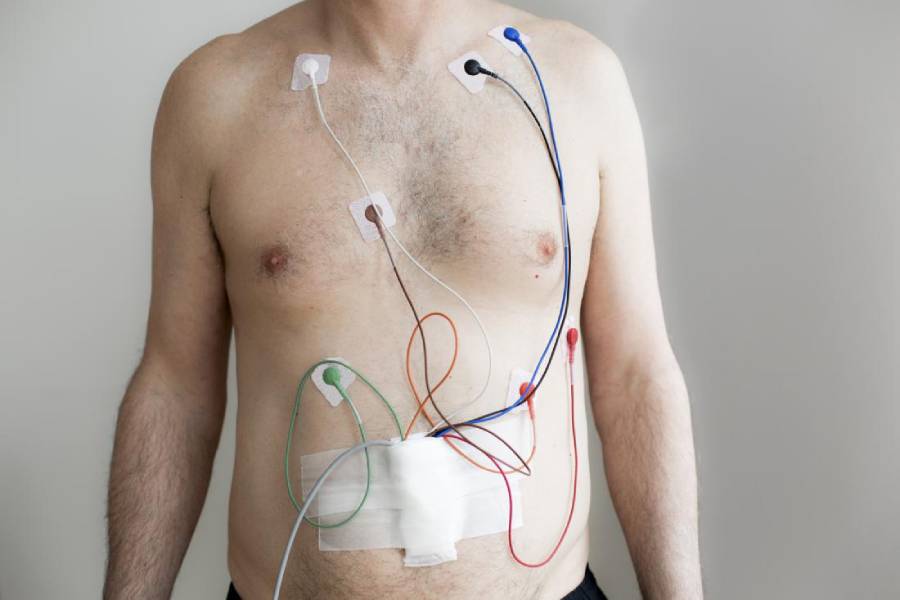A Holter monitor is a type of heart monitor that records your heart’s activity over 24 or 48 hours. If you have an irregular heartbeat or heart palpitations, but an EKG didn’t detect anything, a cardiac monitor can help diagnose the problem. You wear the Holter monitor while you do your daily activities. Your provider discusses the results with you.
What is a Holter monitor?
A Holter monitor is a wearable device and type of ambulatory electrocardiogram that records your heart’s rhythm and rate activity. It gives your provider a full picture of what your heart rhythm and rate do as you go about your life.
This monitor is:
- Small, about the size of a cellphone.
- Battery operated.
- Equipped with wires and electrodes (small patches) that stick to your skin.
A Holter monitor records your heart’s electrical activity for 24 or 48 hours. While you wear it, you continue to do your regular daily activities.

Who needs a Holter monitor?
You may need a Holter monitor if you have an inconclusive electrocardiogram (ECG or EKG), a type of heart test. An inconclusive EKG means it didn’t provide clear results.
Maybe you saw your doctor because of signs of a heart rhythm problem — like your heart is racing or fluttering. Or you had unexplained fainting.
Your provider decided to do an EKG to find the problem. But the EKG only records your heart for a short period. Heart symptoms don’t always happen while you’re in the provider’s office.
If the EKG doesn’t tell your provider what they need to know, a Holter monitor can help. It gathers more information about your heart’s activity. You wear it for a full day or two, giving it more chances to spot unusual activity.
What conditions can a Holter monitor find?
A Holter monitor can find the cause of:
- Arrhythmia (heart rhythm abnormalities).
- Heart palpitations.
- Unexplained dizziness.
Your provider can also use a cardiac monitor to determine how well your:
- The heart is getting oxygen.
- Heart medications are working.
- A pacemaker is working.
When would a Holter monitor not be appropriate?
If you need urgent treatment for heart symptoms, then a Holter monitor would not be appropriate. Providers don’t recommend a cardiac monitor if it delays urgent care. Providers also do not use a Holter monitor for routine screening if you don’t have symptoms.
Are there activities I should avoid while wearing the Holter monitor?
While wearing your cardiac monitor, don’t:
- Bathe, shower or swim.
- Have an X-ray.
- Go near a high-voltage area or metal detector.
What happens after I finish wearing the Holter monitor?
After the 24- or 48-hour period:
- You return the monitor to the technician.
- The technician processes your records, including the EKG and your notes, and sends a report to your provider.
- You get the results of the test within a week or two.
Your provider may recommend:
- More cardiac tests.
- Heart medications.
- Pacemaker
Cardioversion procedure to help your heart return to a steady rhythm.
Ablation (a treatment that uses hot or cold energy to create scar tissue) of abnormal rhythm.
What are the risks of wearing a Holter monitor?
A Holter monitor has no risks or pain associated with it. The electrodes attach to your chest with tape. The tape might cause some itchiness or irritation. Let your provider know if you have any allergies to tapes or adhesives.
When will I get the results for the Holter monitor?
Your provider will call you with the results within a week or two after the test. The results may show that the heart monitor detected a heart rhythm disorder (arrhythmia), such as:
- Atrial fibrillation.
- Bradycardia
- Tachycardia
- Premature ventricular contractions (PVCs).
Your provider will discuss the next steps with you. You may need heart rhythm medications or further testing.
A note from Dr. Dhananjay Ware:
A Holter monitor provides a picture of your heart’s activity over 24 or 48 hours. It can help your provider diagnose the cause of a heart issue that doesn’t show up on an EKG. You wear the Holter monitor while you go about your regular activities. It helps cardiologists figure out what’s causing your heart flutters, racing heart, or dizziness. The test is painless. After you finish the test, Dr. Dhananjay Ware will discuss the results and next steps. You may need further testing or medication.
